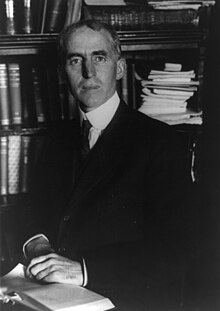
Back تشارلز أ. بيرد Arabic تشارلز ا. بيرد ARZ Çarlz Ostin Bird Azerbaijani Чарлз Биард Bulgarian Charles A. Beard German Charles A. Beard Esperanto Charles Beard Spanish چارلز بیرد Persian Charles A. Beard Finnish Charles Austin Beard French
Charles A. Beard | |
|---|---|
 Beard in 1917 | |
| Born | Charles Austin Beard November 27, 1874 Knightstown, Indiana, U.S. |
| Died | September 1, 1948 (aged 73) New Haven, Connecticut, U.S. |
| Spouse | |
| Academic background | |
| Alma mater | |
| Thesis | The Office of Justice of the Peace in England (1904) |
| Academic advisors | Frederick York Powell[1] |
| Academic work | |
| Discipline |
|
| School or tradition | Progressive historiography |
| Notable works |
|
| Influenced | William Appleman Williams[2] |
Charles Austin Beard (November 27, 1874 – September 1, 1948) was an American historian and professor, who wrote primarily during the first half of the 20th century. A history professor at Columbia University, Beard's influence is primarily due to his publications in the fields of history and political science. His works included a radical re-evaluation of the Founding Fathers of the United States, whom he believed to be more motivated by economics than by philosophical principles. Beard's most influential book, An Economic Interpretation of the Constitution of the United States (1913), has been the subject of great controversy ever since its publication. While it has been frequently criticized for its methodology and conclusions, it was responsible for a wide-ranging reinterpretation of early American history.[3]
An icon of the progressive school of historical interpretation, his reputation suffered during the Cold War when the assumption of economic class conflict was dropped by most American historians. The consensus historian Richard Hofstadter concluded in 1968, "Today Beard's reputation stands like an imposing ruin in the landscape of American historiography. What was once the grandest house in the province is now a ravaged survival."[4] Hofstadter nevertheless praised Beard by saying he was "foremost among the American historians of his or any generation in the search for a usable past."[5]
- ^ Wilkins 1959, p. 21.
- ^ Siegel 1997, p. 156.
- ^ Gibson 2006, pp. 7–12; Kraus & Joyce 1985, pp. 252–265.
- ^ Hofstadter 1968, p. 344.
- ^ Kraus & Joyce 1985, pp. 252–265.